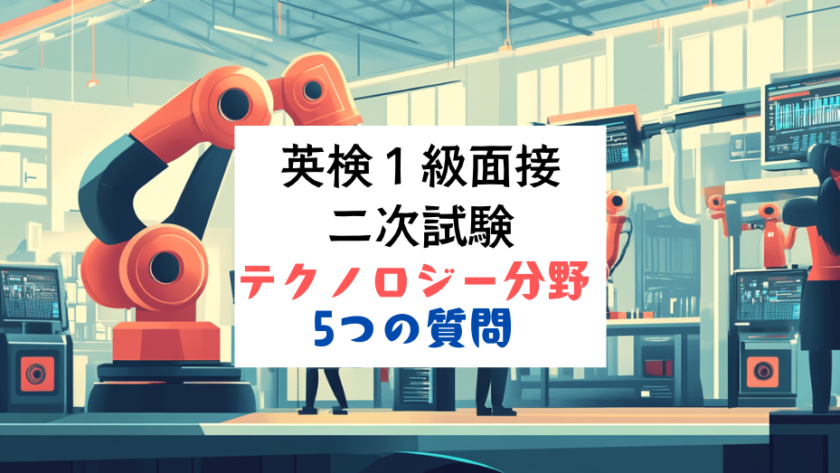目次
- 1 試験概要と流れ
- 2 トレーニング手順
- 3 5つの質問
- 4 観点整理とサンプル回答
- 4.1 1. Positive and Negative Effects of Technology on Education
- 4.2 論理展開・観点
- 4.3 論理展開・観点
- 4.4 2. Should Governments Regulate AI Development
- 4.5 論理展開・観点
- 4.6 3. How Technology Has Influenced Social Relationships
- 4.7 論理展開・観点
- 4.8 4. Ethical Use of Facial Recognition in Public Spaces
- 4.9 論理展開・観点
- 4.10 5. Will Human Jobs Be Replaced by Machines in the Near Future
- 4.11 論理展開・観点
- 5 英作文(意見論述・要約問題)対策テキスト
試験概要と流れ
- 入室
- 「面接カード」を渡す
- 着席
- 氏名の確認と簡単な日常会話
- 「トピックカード」を受け取る:様々な分野が混ざっている
- スピーチ準備(1分間)
- スピーチ(2分間):概ね180〜240語(話すスピードによって異なる)
- Q&A(4分間)
スピーチの内容に関する2-3の質問 - 「トピックカード」返却
- 退室
トレーニング手順
- カテゴリー(分野)毎に観点とキーワード整理(10分程度)
- 実際にスピーチをして録音して聞き直す(2分+聞き直し)
- 満足できるまで数回繰り返す
- カテゴリー別に話せる様になったら本番形式(トピックが混ざったカード)でトレーニングを行う
5つの質問
質問文を見て、連想される観点・キーワードを書き出してみましょう
トレーニング用に同じ分野のトピック(今回はテクノロジー)を5つ記載していますが、実際のトピックカードは、5つの異なる分野から出題されます。
- What are the positive and negative effects of technology on education?
- Should governments regulate the development of artificial intelligence?
- How has technology influenced social relationships?
- Is it ethical to use facial recognition technology in public spaces?
- Will human jobs be replaced by machines in the near future?
- テクノロジーが教育に与えるプラス面とマイナス面は何ですか?
- 政府は人工知能の開発を規制すべきでしょうか?
- テクノロジーは社会的関係にどのような影響を与えましたか?
- 公共の場で顔認証技術を使用することは倫理的ですか?
- 近い将来、人間の仕事は機械に取って代わられるでしょうか?
観点整理とサンプル回答
対策初期は、トピック毎に観点整理をするのが効果的です。
色々なトピックについて観点とキーワード整理をしていくうちに、ざっくりと自分の中で分野ごとの語いの引き出しが増えてきます。
それでは質問ごとに「観点とイメージ画像・サンプル論理展開・サンプル回答・対訳」を表示していきますので、お好きな質問からご覧ください。
1. Positive and Negative Effects of Technology on Education
テクノロジーが教育に与えるプラス面とマイナス面
プラス面
- アクセスの拡大 (Increased access): インターネットやデジタルデバイスによる教育資源の普及
- 教材のインタラクティブ性 (Interactive materials): ゲームベースの学習、動画教材、AIを活用した学習サポート
- 柔軟な学習環境 (Flexible learning): オンライン教育、遠隔教育、時間・場所に縛られない学習
- 個別最適化 (Personalization): 学習ペースに応じたカスタマイズが可能なプラットフォーム
- 協働的学習 (Collaborative learning): ソーシャルメディアやオンラインツールを活用したグループプロジェクトや交流
マイナス面
- デジタルデバイド (Digital divide): 経済的・地理的要因によるテクノロジーへのアクセス格差
- 依存の危険性 (Over-reliance): 伝統的な学習方法や思考能力の弱体化
- プライバシーの問題 (Privacy concerns): 学生データの扱い、個人情報漏洩のリスク
- 過剰なスクリーンタイム (Excessive screen time): 健康への影響(視力低下、運動不足)
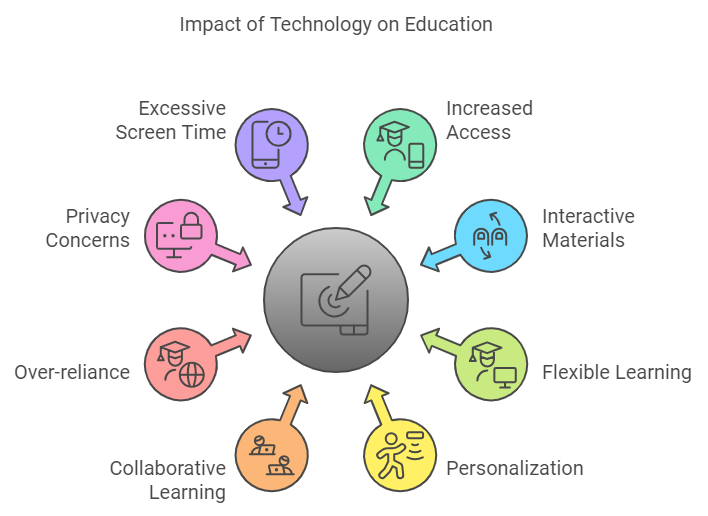
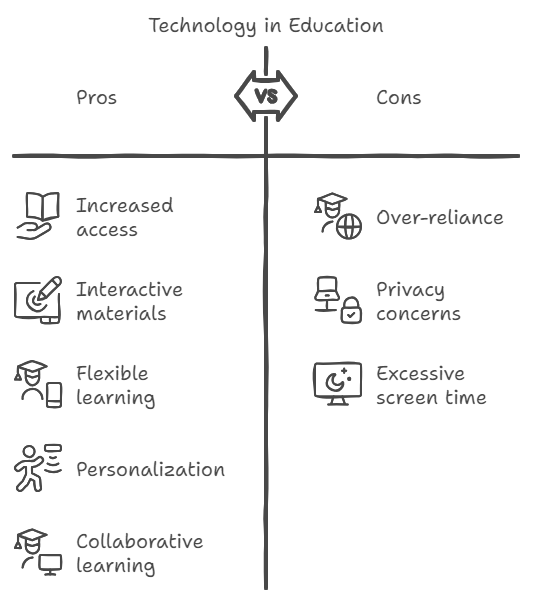
論理展開・観点
- 教育のアクセス向上:インターネットを通じたオンラインコースや学習資源の活用で、遠隔地や通学が難しい人々も質の高い教育を受けられる。
- 個別学習の促進:AIやオンラインプラットフォームにより、生徒は自分のペースで学習でき、個別対応が可能に。
- 協力学習の支援:ビデオ会議などのテクノロジーで、生徒と教師が遠距離でも協力しやすくなる。
Positive Effects of Technology on Education
I believe technology has greatly improved education.
First, it makes education more accessible. With the Internet, students can learn from anywhere in the world. Online courses allow people who live in remote areas or who cannot attend school in person to still get a quality education. This is a huge benefit for those who may otherwise miss out on learning opportunities. Additionally, students can access a wide range of resources online, such as e-books, academic journals, and videos, which makes learning more engaging and efficient.
Second, technology allows for more personalized learning. With AI and online platforms, students can study at their own pace. They can repeat lessons if they need to or move forward if they understand the material quickly. This flexibility helps students achieve better results and stay motivated in their studies. Furthermore, students can track their progress through online assessments and receive instant feedback, which allows for continuous improvement.
Finally, technology makes it easier for students and teachers to collaborate. Platforms like video conferencing allow students to participate in group projects even if they are far apart.
In conclusion, technology has made education more flexible, personalized, and accessible for students around the world, ultimately improving learning outcomes.(200 words)
教育に与えるプラス面
私は、テクノロジーが教育を大いに改善したと信じています。
まず、教育へのアクセスが容易になりました。インターネットを使えば、学生は世界中どこからでも学習できます。オンラインコースは、遠隔地に住む人や、対面で学校に通えない人々でも質の高い教育を受けられるようにしています。これは、学ぶ機会を逃す可能性があった人々にとって大きな利点です。さらに、学生は電子書籍、学術雑誌、ビデオなど、幅広いオンライン資源にアクセスでき、学習をより魅力的で効率的に進めることができます。
次に、テクノロジーは個別学習を可能にします。AIやオンラインプラットフォームを使えば、生徒は自分のペースで学習できます。必要ならばレッスンを繰り返し、早く理解できた場合は先に進むことができます。この柔軟性は、生徒がより良い結果を出し、学習への意欲を保つのに役立ちます。さらに、オンラインの評価を通じて自分の進捗を追跡し、即座にフィードバックを受け取ることで、継続的な改善が可能になります。
最後に、テクノロジーは生徒と教師が協力しやすくします。ビデオ会議などのプラットフォームを使えば、遠くにいる生徒同士でもグループプロジェクトに参加できます。
結論として、テクノロジーは教育をより柔軟で、個別化され、アクセスしやすくしており、世界中の学生に利益をもたらしています。
論理展開・観点
- デジタルデバイド:テクノロジーへのアクセスの不平等が教育における格差を拡大する。
- テクノロジー依存:伝統的な学習スキルが弱体化し、批判的思考や問題解決能力が低下するリスク。
- 健康への悪影響:過剰なスクリーンタイムが学生の身体的・精神的健康に影響を与える。
Negative Effects of Technology on Education
I believe technology also has some negative effects on education.
One issue is the digital divide. Not all students have access to the Internet or the latest devices. This creates inequality in education. Some students can benefit from online learning, while others are left behind because they cannot afford the necessary technology. This can widen the gap between students from wealthy backgrounds and those from disadvantaged communities, leading to unequal educational outcomes.
Another problem is that students may become too dependent on technology. They may rely on computers or calculators to solve problems instead of thinking for themselves. This can make it harder for them to develop important skills like critical thinking and problem-solving. Traditional learning methods, such as reading books and practicing problem-solving on paper, are still important for cognitive development, and they should not be replaced entirely by technology.
Finally, too much screen time can have negative health effects. Students who spend too much time on their devices may suffer from eye strain, headaches, or reduced physical activity. This can lead to both physical and mental health issues, which can impact their ability to focus and learn effectively.
In conclusion, while technology has improved education in many ways, it also creates challenges that need to be addressed.
教育に与えるマイナス面
私は、テクノロジーが教育にいくつかのマイナスの影響も与えていると考えています。
ひとつの問題は、デジタルデバイドです。すべての学生がインターネットや最新のデバイスにアクセスできるわけではありません。これが教育における不平等を生み出しています。オンライン学習の恩恵を受けられる学生もいれば、必要な技術を買う余裕がないために遅れを取ってしまう学生もいます。このことは、裕福な家庭の学生と恵まれないコミュニティの学生との間に教育格差を生み出し、不平等な学習成果につながる可能性があります。
もう一つの問題は、学生がテクノロジーに過度に依存するようになる可能性です。自分で考えずに、コンピュータや電卓に頼って問題を解決するようになるかもしれません。これにより、批判的思考や問題解決のような重要なスキルを発展させることが難しくなります。読書や紙を使った問題解決の練習などの従来の学習方法は、認知能力の発展において依然として重要であり、完全にテクノロジーに置き換えるべきではありません。
最後に、過度なスクリーンタイムは健康に悪影響を与える可能性があります。デバイスを使いすぎると、目の疲れ、頭痛、運動不足に悩まされることがあります。これにより、身体的・精神的な健康問題が生じ、集中力や学習効果に悪影響を及ぼす可能性があります。
結論として、テクノロジーは教育を多くの点で改善しましたが、解決すべき課題も生み出しています。
2. Should Governments Regulate AI Development
(政府は人工知能の開発を規制すべきか)
規制すべき理由
- 倫理的問題 (Ethical concerns): バイアス、差別的アルゴリズム、AIによる監視やプライバシー侵害
- 経済的不平等 (Economic inequality): AIが労働市場に与える影響、特定のスキルや職業が失われる可能性
- セキュリティリスク (Security risks): AIの悪用、サイバー犯罪やハッキング、軍事技術への応用
- 透明性と説明責任 (Transparency and accountability): AIシステムのブラックボックス化、防ぐための基準設定
規制すべきでない理由
- 技術革新の妨げ (Stifling innovation): 規制が新しい技術や市場の成長を阻害する可能性
- 国際競争力 (Global competitiveness): 他国が先行してAI技術を開発するリスク
- 規制の難しさ (Difficulty of regulation): 技術の進展が速く、適切なルールを作るのが難しい
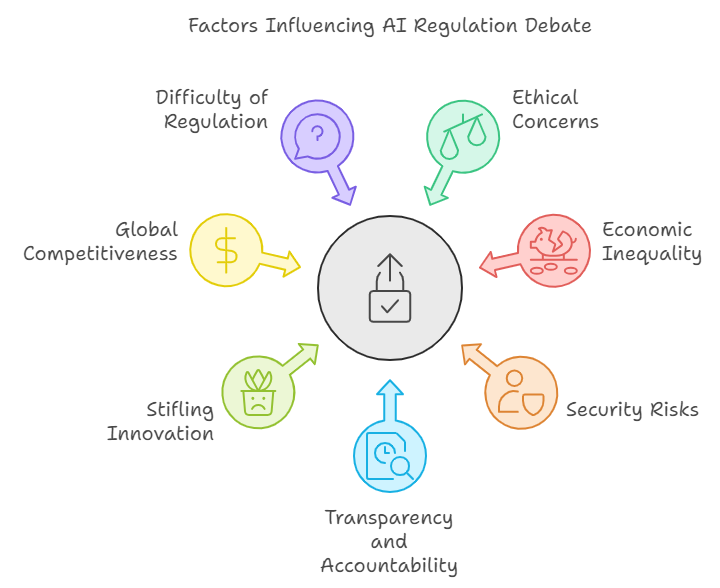
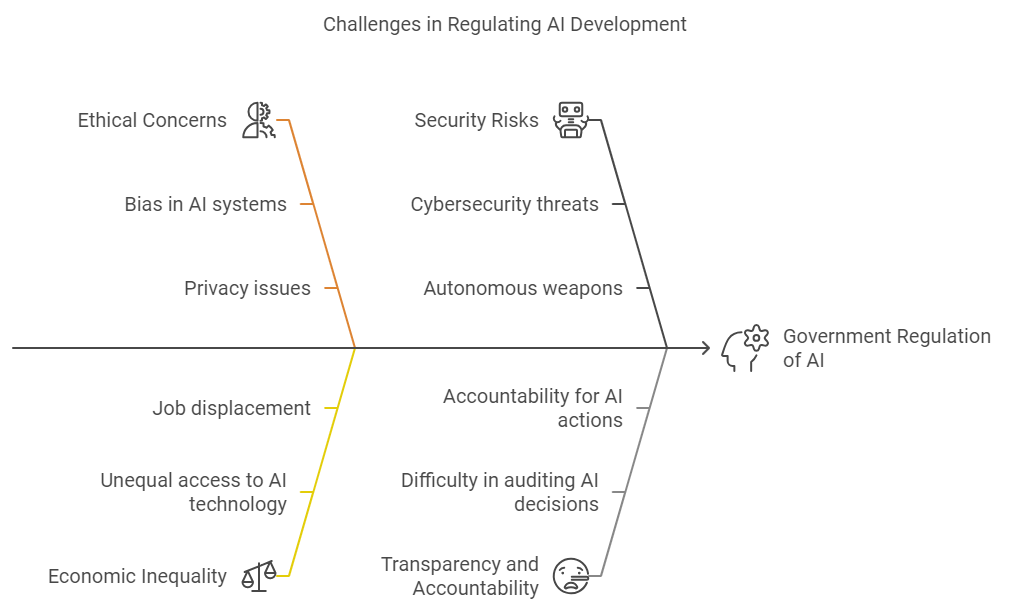
論理展開・観点
- 人権保護:AIが偏った判断や不正確な決定を下すことがあり、人権侵害のリスクがあるため規制が必要。
- 雇用の保護:AIが多くの仕事を奪う可能性があり、労働者の保護や教育への投資が求められる。
- プライバシー保護:AIによる監視やデータの不正使用が懸念され、プライバシーの保護が重要。
Should Governments Regulate AI Development)
I believe that governments should regulate the development of artificial intelligence.
One reason is that AI has the potential to cause harm if it is not properly controlled. For example, AI systems can make decisions that impact people’s lives, such as in healthcare or law enforcement. If these systems are biased or inaccurate, they could make unfair decisions that harm individuals. Governments should create rules to ensure that AI is used ethically and does not negatively affect people’s rights.
Another reason is the potential for job loss. As AI continues to develop, more jobs may be replaced by machines, leaving many people unemployed. Governments need to regulate AI to protect workers and ensure that the benefits of AI are shared fairly across society. This includes investing in education and training programs to help workers adapt to new technologies.
Finally, there are concerns about privacy and security. AI can be used to monitor people’s behavior, raising concerns about surveillance and data protection. By regulating AI, governments can set limits on how data is collected and used, ensuring that citizens’ privacy is respected.
In conclusion, governments should regulate AI to protect citizens, prevent job loss, and ensure that AI is used responsibly.
政府は人工知能の開発を規制すべきか)
私は、政府が人工知能(AI)の開発を規制すべきだと考えています。
その理由の一つは、AIが適切に管理されなければ害を引き起こす可能性があるからです。例えば、AIシステムは、医療や法執行など、人々の生活に大きな影響を与える決定を下すことができます。これらのシステムが偏見を持っていたり、正確でなかったりすると、不公平な決定が行われ、個人に被害をもたらす可能性があります。政府は、AIが倫理的に使用され、人々の権利を侵害しないようにするためのルールを作るべきです。
もう一つの理由は、失業の可能性です。AIが発展するにつれて、ますます多くの仕事が機械に取って代わられ、失業する人が増えるかもしれません。政府は労働者を保護し、AIの恩恵が社会全体に公平に分配されるようにするために規制を行う必要があります。これには、新しい技術に適応するための教育や研修プログラムへの投資が含まれます。
最後に、プライバシーとセキュリティに関する懸念があります。AIは人々の行動を監視するために使用されることがあり、監視社会やデータ保護に関する問題が生じます。AIを規制することで、政府はデータの収集と使用に制限を設け、市民のプライバシーを守ることができます。
結論として、政府は市民を保護し、失業を防ぎ、AIが責任を持って使用されるようにするために、AIを規制すべきです。
3. How Technology Has Influenced Social Relationships
(テクノロジーは社会的関係にどのような影響を与えたか)
ポジティブな影響
- コミュニケーションの促進 (Enhanced communication): ソーシャルメディア、メッセージングアプリ、ビデオ通話の普及
- 地理的な障壁の軽減 (Reduced geographical barriers): 遠くに住む家族や友人との接触が容易に
- コミュニティの拡大 (Community expansion): オンラインフォーラムや興味・趣味に基づくグループ形成
ネガティブな影響
- 孤独感 (Isolation): 実際の対面の時間が減少し、孤独感が増す場合
- プライバシーとセキュリティ (Privacy and security concerns): 個人情報の公開、監視、データ漏洩のリスク
- コミュニケーションの質の低下 (Reduced communication quality): 浅い交流や誤解のリスクが増加
- テクノロジー依存 (Technology dependence): SNSへの依存や常時接続によるメンタルヘルスへの悪影響
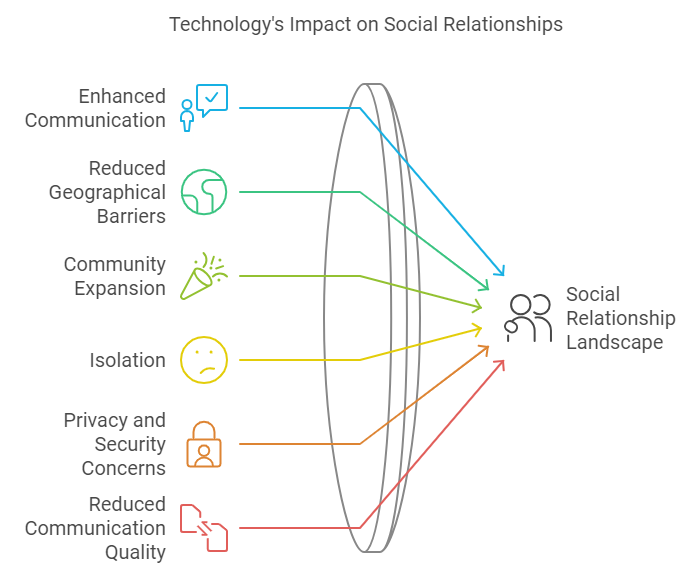
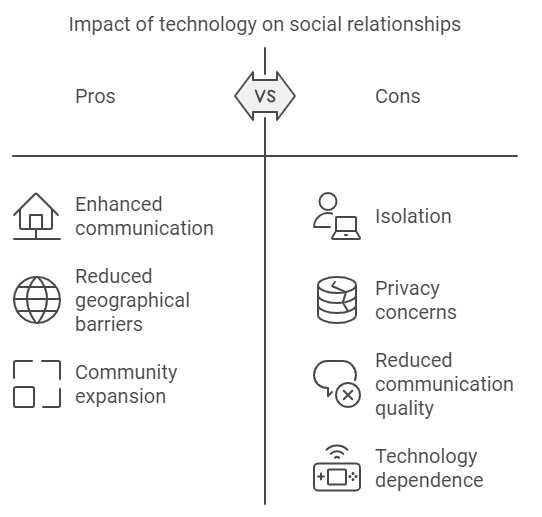
論理展開・観点
- 人とのつながりを強化:ソーシャルメディアやメッセージングアプリによって遠距離でもコミュニケーションが可能になった。
- コミュニケーションの質の低下:簡単なメッセージのやり取りが増える一方で、対面での深い対話が減少し、孤立感を感じやすくなる。
- プライバシーのリスク:オンラインで個人情報が共有されることで、プライバシーが脅かされるリスクが高まる。
How Technology Has Influenced Social Relationships
I believe technology has changed social relationships in both positive and negative ways. On the positive side, technology has made it easier for people to stay connected. Social media platforms like Facebook, Instagram, and messaging apps allow people to communicate instantly, regardless of distance. This is especially beneficial for maintaining long-distance relationships or staying in touch with friends and family who live far away.
However, technology has also had some negative effects on social relationships. One issue is that it can reduce the quality of communication. While it is easy to send a quick message, these interactions are often shallow and lack the depth of face-to-face conversations. Over time, people may feel more isolated or lonely, even though they are constantly connected online. Furthermore, social media can create unrealistic expectations by showing only the highlights of people’s lives, leading to feelings of inadequacy or envy.
Finally, technology can sometimes contribute to a lack of privacy. With so much personal information shared online, it’s easier for people to feel exposed or vulnerable.
In conclusion, while technology has made communication more convenient, it has also created new challenges for social relationships, including feelings of isolation and privacy concerns.
テクノロジーは社会的関係にどのような影響を与えたか
私は、テクノロジーが社会的関係にプラス面とマイナス面の両方をもたらしたと考えています。プラス面では、テクノロジーは人々がつながりやすくなる手助けをしています。FacebookやInstagram、メッセージングアプリなどのソーシャルメディアプラットフォームを通じて、距離に関係なく瞬時にコミュニケーションが取れるようになりました。これは、遠距離の関係を維持したり、遠くに住む友人や家族との連絡を保つのに特に役立ちます。
しかし、テクノロジーは社会的関係にいくつかのマイナスの影響も与えています。一つの問題は、コミュニケーションの質が低下することです。短いメッセージを送るのは簡単ですが、これらのやり取りはしばしば浅く、対面での会話ほど深いものではありません。長期的には、常にオンラインでつながっているにもかかわらず、人々はより孤立したり、孤独を感じるかもしれません。さらに、ソーシャルメディアは、他人の生活のハイライトだけを見せるため、劣等感や嫉妬の感情を引き起こすことがあります。
最後に、テクノロジーはプライバシーの欠如に寄与することがあります。オンラインで多くの個人情報が共有されているため、人々はさらされている、または脆弱であると感じやすくなります。
結論として、テクノロジーはコミュニケーションをより便利にしましたが、孤立感やプライバシーの問題など、新たな課題も生み出しています。
4. Ethical Use of Facial Recognition in Public Spaces
公共の場で顔認証技術を使用することの倫理性
賛成意見
- 治安維持 (Public safety): 犯罪抑止、テロ対策、犯罪者追跡への有効活用
- 迅速な認証 (Efficient identification): 公共サービスや交通機関での認証時間の短縮
- 効率的なリソース管理 (Efficient resource allocation): 監視やセキュリティ業務の効率化
反対意見
- プライバシーの侵害 (Privacy invasion): 無許可で個人情報が収集される危険性
- 誤認識のリスク (Risk of misidentification): 技術の精度の問題、誤った逮捕や偏見の助長
- 監視社会への懸念 (Surveillance society): 監視が常態化し、個人の自由が制限される可能性
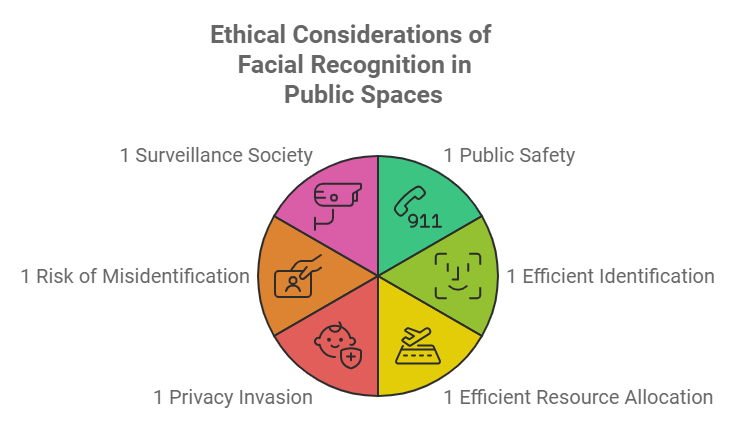
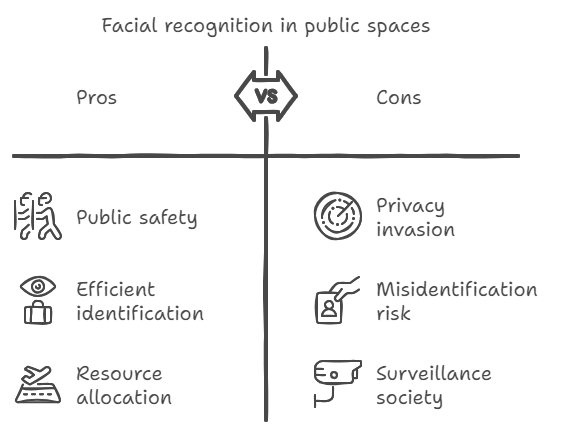
論理展開・観点
- プライバシーの侵害:顔認証技術が個人の同意なく情報を取得し、人々が監視されるリスクがある。
- 不正確な技術:顔認証システムが誤認識を引き起こし、特定の人種や民族に対して偏見を持つ可能性がある。
- 悪用のリスク:政府や企業が顔認証技術を使って個人の行動を監視し、自由を制限する恐れがある。
Is It Ethical to Use Facial Recognition Technology in Public Spaces
I believe that using facial recognition technology in public spaces is unethical.
One reason is that it invades people’s privacy. Facial recognition systems can identify individuals without their consent, which means people can be monitored without even knowing it. This creates a sense of constant surveillance, which can make people feel uncomfortable or unsafe in public areas. Everyone has the right to privacy, and this technology threatens that right.
Another reason is that facial recognition technology is not always accurate. Studies have shown that these systems are often biased, particularly against people of certain racial or ethnic groups. If the technology makes a mistake, it could result in wrongful identification or unfair treatment, such as being falsely accused of a crime. This raises serious concerns about fairness and justice in society.
Finally, facial recognition technology could be misused by governments or corporations to control people’s behavior. In some countries, this technology has been used to monitor political dissent or to restrict freedoms. This kind of misuse could lead to a loss of civil liberties.
In conclusion, while facial recognition technology may have some benefits, it poses significant ethical risks, particularly regarding privacy, fairness, and misuse.
公共の場で顔認証技術を使用することの倫理性
私は、公共の場で顔認証技術を使用することは倫理的ではないと考えています。
その理由の一つは、プライバシーを侵害することです。顔認証システムは、個人の同意なしに彼らを特定することができ、人々は知らないうちに監視される可能性があります。これにより、常に監視されていると感じるようになり、公の場で不安や安全性の低下を感じるかもしれません。すべての人にはプライバシーの権利があり、この技術はその権利を脅かします。
もう一つの理由は、顔認証技術が必ずしも正確ではないことです。研究によれば、これらのシステムは特定の人種や民族に対して偏見を持つことが多いとされています。技術が間違いを犯すと、不当な特定や、誤って犯罪の容疑者とされるなど、不公平な扱いを受ける可能性があります。これは、社会における公平性と正義に関する重大な懸念を引き起こします。
最後に、顔認証技術は、政府や企業によって人々の行動を制御するために悪用される可能性があります。一部の国では、この技術が政治的反対者の監視や、自由を制限するために使われています。このような悪用は、市民の自由の喪失につながる可能性があります。
結論として、顔認証技術にはいくつかの利点があるかもしれませんが、プライバシー、公平性、悪用に関する重大な倫理的リスクを伴います。
5. Will Human Jobs Be Replaced by Machines in the Near Future
近い将来、人間の仕事は機械に取って代わられるか
機械に取って代わられる職種
- 反復的作業 (Repetitive tasks): 製造業、物流業務、データ入力などの単純作業
- AIによる自動化 (Automation by AI): 顧客サービス、翻訳、基本的な医療診断
- 低スキル職 (Low-skill jobs): ファーストフード、工場労働など
残る職種
- 創造的・戦略的業務 (Creative and strategic jobs): アーティスト、作家、ビジネス戦略家
- 感情労働 (Emotional labor): カウンセラー、看護師、教師など人間の感情を必要とする職業
- 高度な技術職 (Highly skilled jobs): エンジニア、医師、弁護士など
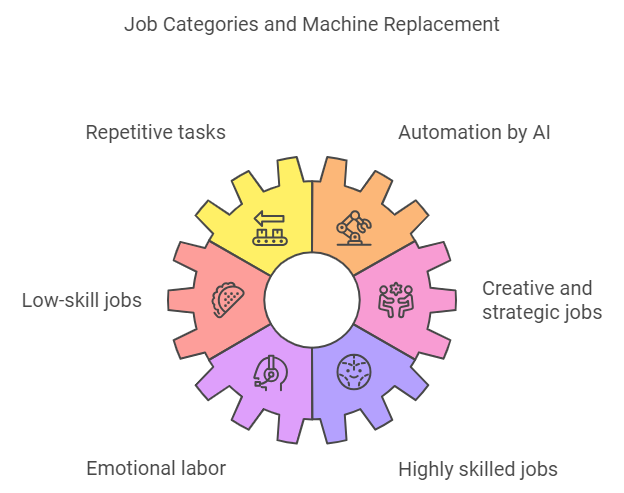
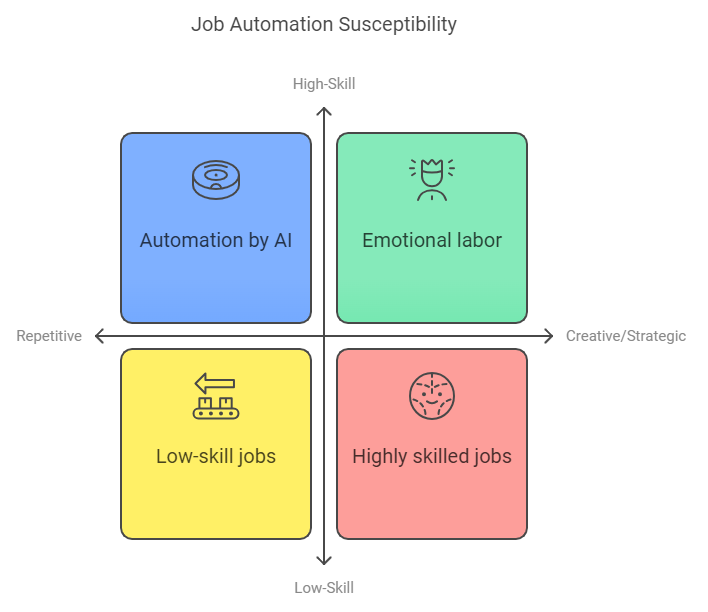
論理展開・観点
- 単純作業は機械に置き換えられる:反復的な作業やデータ処理など、機械が効率的に行える仕事はすでに自動化されつつある。
- 創造的・感情的な仕事は人間に残る:創造性や感情的な判断を伴う仕事は、人間の強みであり、機械に取って代わられることは難しい。
- 新しい職業の創出:テクノロジーの進化により、新しい職業が生まれる可能性があり、人間が新しいスキルを学ぶことで仕事はなくならない。
Will Human Jobs Be Replaced by Machines in the Near Future
I believe that some human jobs will be replaced by machines in the near future, but not all of them.
One reason is that machines are becoming more capable of performing repetitive tasks. Jobs in manufacturing, data entry, and even customer service are increasingly being automated. Machines can perform these tasks more efficiently and at a lower cost than humans, making it likely that many jobs in these fields will be replaced.
However, not all jobs can be replaced by machines. Jobs that require creativity, emotional intelligence, or complex decision-making are still difficult for machines to handle. For example, artists, teachers, and therapists need to interact with people in ways that machines cannot replicate. These jobs require human empathy, intuition, and the ability to adapt to unique situations, which are qualities that machines lack.
Moreover, while machines may replace some jobs, new jobs will likely be created. As technology advances, there will be a demand for workers who can design, maintain, and oversee these machines. In conclusion, while machines will take over some jobs, humans will continue to play a crucial role in many areas, and new opportunities will emerge as technology evolves.
近い将来、人間の仕事は機械に取って代わられるか
私は、近い将来、一部の仕事は機械に取って代わられるだろうと考えていますが、すべてではないと思います。
理由の一つは、機械がますます反復的な作業をこなせるようになっているからです。製造業やデータ入力、さらには顧客サービスの分野では、自動化が進んでいます。機械はこれらの作業を人間よりも効率的に、低コストで行うことができるため、多くの仕事が置き換えられる可能性があります。
しかし、すべての仕事が機械に置き換えられるわけではありません。創造力や感情的な知性、複雑な意思決定が必要な仕事は、機械にはまだ難しいからです。たとえば、アーティスト、教師、セラピストは、人々と対話し、機械では再現できない形で関わる必要があります。これらの仕事には、人間の共感、直感、そして独自の状況に適応する能力が必要であり、これらは機械にはない特質です。
さらに、機械が一部の仕事を置き換えたとしても、新しい仕事が生まれるでしょう。技術が進化するにつれて、これらの機械を設計、保守、管理するための労働者が必要になります。結論として、機械は一部の仕事を引き継ぐかもしれませんが、人間は多くの分野で重要な役割を果たし続け、技術の進歩に伴い新たな機会が生まれるでしょう。
その他の観点
- 労働市場の再編 (Reshaping of the job market): 新しい技術を活用した職業の登場、リスキリングの重要性
- ベーシックインカム (Basic income): 人々が仕事を失う場合の社会的保障の必要性
英検1級英作文(意見論述・要約問題)・二次試験(面接)リストはコチラ
英検1級トピック探しにおススメのサイト:Britanica ProCon.org
英作文(意見論述・要約問題)対策テキスト

「どんなテキストがおすすめですか?」とよく聞かれるのですが、「問題量が多い」ものと「知識量を増やせるもの」の2種類を準備すると良いかと思います。
また、あまりにも文法解説が長いテキストは、英検1級対策としては、「?」という感じがします。
「何を、どんな観点で、どう伝えるか」にフォーカスして書かれたテキストを選んでください。
英作文テキストは、「最低でも3ラウンドする」。語彙や表現を増やす系のテキストは「最低でも5ラウンドする」つもりで、1ページごとに時間をかけすぎず、分からない時はすぐにググりながらテンポよく進めていきます。

